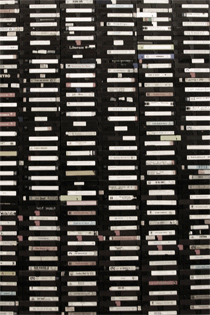Contribution à une socio-anthropologie de l’enchantement à partir de l’étude comparée du « Gamarada » et de la « Communication animale intuitive ».
Robin Susswein et Edgar Tasia | 07.04.2020
Some emotionally intense “wonderful” experiences, which are particularly difficult to qualify by those who experience them, have been studied by sociology and anthropology as “enchantment experiences”. How to qualify this type of experiences? What circumstances can contribute to their emergence? Based on the ethnographic study of two initiatory practices (the “Gamarada” and the “Animal Intuitive Communication”), the authors underline the benefits and the limits of the heuristic model of the "technology of enchantment" built by Halloy and Servais. This [...]
Aurore Flipo et Patricia Lejoux | 03.04.2020
Born in 2005 in San Francisco and spread in Europe in the 2010s, the coworking spaces (CS) have progressively appeared as symbols of the new lifestyles and work processes derived from the digital revolution. This « new economy » has generated both forms of liberation from the spatial and temporal constraints, and new needs of co-presence and social interactions. CS have thus appeared as a potential answer to some of the social and spatial contemporary issues. While coworking as [...]
Enka Blanchard | 27.03.2020
This article explores the relationships that disabled people have with the space surrounding them. Extending Jacques Lévy’s work on various non-Euclidean spatialities, we study the discontinuous and discrete nature of space as inhabited by disabled people, with a focus on people with physical impairments. We start at a local scale, with perceptions of one’s body, of one’s environment, and the algorithmic nature of conscious movement. Lack of autonomy, often a consequence of society’s (lack of) accessibility, creates an experience [...]
Jean-Nicolas Fauchille | 20.03.2020
Une société juste. La réunion des termes justice et espace ne va pas de soi. En effet, les théories de la justice a-spatiales étaient considérées jusqu’à présent comme les seules auxquelles on avait recours pour répondre à la question : qu’est-ce qu’une société juste ? Savoir ce qu’est un espace juste ne faisait pour ainsi dire pas [...]
| 14.03.2020
Le colloque Les droits de l’art. Perspectives sur une recherche pluridisciplinaire sera l’occasion de faire dialoguer des juristes et des chercheurs en sciences humaines et sociales autour de l’art, de son interprétation et de ses droits. Il émane du laboratoire de recherche franco-québécois L’art en procès (www.uqtr.ca/art-en-proces), qui réunit des juristes, des linguistes et des spécialistes de l’art et [...]
Michael Lucken et Karoline Postel-Vinay | 05.03.2020
Our societies appear increasingly polarized between the camp of the advocates of "de-globalization" and that of the relentless globalists. Such polarization obscures, by caricaturing it, the complexity of the challenge of human plurality and generates a dilemma, illusory to a certain extent, between the quest for generality and the consideration of particularities. In the humanities and social sciences, this dilemma takes the shape, among others, of a recurring debate about the relation between “the disciplines” and area studies. Overcoming [...]
Hybridations des pratiques artistiques et nouvelles pédagogies.
| 03.03.2020
Dans l’ouvrage Une brève histoire des lignes, l’anthropologue Tim Ingold introduit l’analyse d’une distinction (à première vue quasiment imperceptible) entre les deux termes anglais «between» et «in- between ». Alors que la préposition « entre » crée des connexions dans un monde qui a été au préalable compartimenté et fonctionne comme un pont entre des [...]
Clément Renaud et Florence Graezer Bideau | 28.02.2020
The present article relates how the figure of the « maker» has become an important figure in China’s recent industrial and urban policies. As Chinese cities are transitioning from a labor-intensive industry (Made in China) to an innovation-centered service economy (Created in China), the country is facing an urgent need for political leadership renewal. The « maker movement » has grown internationally to create new models for businesses and organisations using digital fabrication technologies, with the promise of bringing [...]
Mélanie Le Guen | 21.02.2020
The actors, tools, discourses, practices related to the field of self-development have thrived since the early twenties in the United States and in Europe, as a response to societies’ will to live better lives. Time, especially as far as the many possible temporalities are concerned, is one of the main themes of self-development. Thus, Kairos and Kronos materialize the idea that contemporary Western societies live in relation to two temporal regimes – one being chronological, and the other kairetical. [...]
| 16.02.2020
Ce colloque s’intéresse aux points de passages, d’échanges et de dialogues entre les arts chorégraphiques et les arts visuels. Il s’agit d’envisager la transposition, dans son sens premier, d’idées ou de formes d’un medium à un autre et d’en identifier les traces. La thématique de notre colloque Danse et arts visuels : gestes, échos, passages touche un vaste [...]


